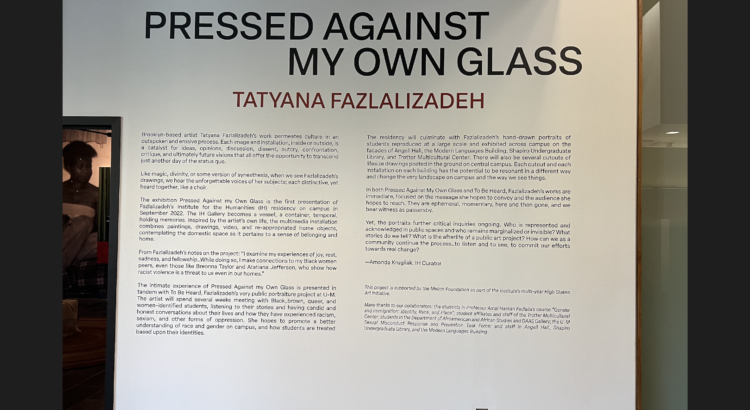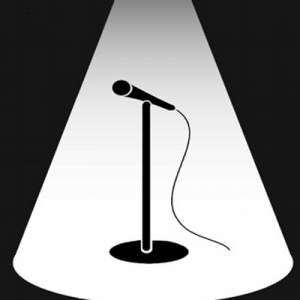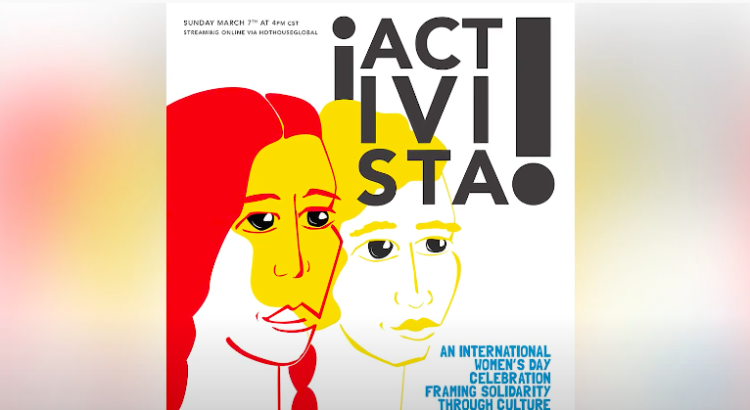Entering the exhibit felt like walking into a home. In the doorway, I paused and thought, should I take my shoes off?
I walked in to look at the first painting, and backed up a little seeing how big it was. Am I allowed to stand on this carpet? I wondered. Knowing the reappropriated furniture had originally come from the artist’s own home, and being used to the etiquette of museums, Pressed Against My Own Glass was refreshing in its way of inviting you in to interact with the art.
The first painting stares at you with a piercing gaze that scrutinizes you and feels alive. Looking into your soul without so much as a raised eyebrow or any tell of effort being put into making up their expression, makes the gaze all the more powerful and unnerving. So much that I forgot to photograph her. The subject is in an intimate space in the portrait, wearing just a shirt and no pants, sitting in an unmade bed. But I’m the one who feels stripped bare.
This theme of intimacy continued to bear itself through the rest of the room. There are diary entries on the wall on the same side as the door. Right away, you step into exclusive, individual territory. Anyone could have seen the murals, whether they wanted to or not, but those who have come to the exhibit have come by choice. Tatyana rewards and welcomes that. This sets the tone for the rest of the exhibit.
To put your journal pages, scanned, then blown up on a wall is incredibly brave, I thought.
There were entries about accomplishments, revelations, longings, growing. I shared sentiments with all of them, but the final one I read in the bottom right corner is a moment I feel most women are familiar with. The chastising, the incredulity at our own selves, our own hearts. I’ve had the same feelings over feeling so much about a silly little man, so much that I write about them, and now it’s tucked in the pages here for anyone to read, forever.
The cracked lampshade, the laminate album of rusted ink photographs; I was really coming into a home. How she could lay down something so personal in a public space, give it up for an exhibition, baffled me. I would want to keep those artifacts close, not letting them leave my bedroom bookshelf. Not even laying the photo album open on a table, only taking it out to indulge myself once a year or so. Tatyana’s courage to lay down so much of herself for others to view inspired me immensely to take more risks in my own art.
Something that especially delighted me was the writing. Since I was expecting pure visual art, I loved the poetry and journal entries and letters. Tatyana collages together a photo, mirror, sketch, earrings, and poetry on the second wall. I love the expression of the girl in the photograph because in its position of covering the poem’s body, her face says, I know you want to read this poem, but hahaha you can’t!
Following right after was the mirror where I fixed my headband. It surprised me to see myself while forgetting my existence, after a few minutes of just perusing through Tatyana’s world.
Just when I thought it couldn’t get more personal, I was brought to tears by Tatyana’s letter to her lifelong (lives long) friend who had passed away. It was while I was reading the letter that I ignored a call from my sister (probably exactly what Tatyana would have discouraged) because I was halfway through and wanted to see it to the end without interruption.
On the fourth wall, was a video projected over a large body of text. The audio included mellow and haunting hummings, the repeated chant of “I made / met peace up in my home,” and a woman in tears singing, “when I think of home, I think of a place where love overflows…”
The clips were calm moving stills. They displayed the motions within a home, like rolling over in bed, humming amidst housework. There were also home videos, facetime clips, a mother getting interviewed with a baby in her lap.
Beneath the projection, the piece reads, “despite the brutal reality of racial apartheid, of domination, one’s homeplace was the one site where one could freely confront the issue of humanization, where one could resist. Black women resisted by making homes where all black people could strive to be subjects, not objects, where we could be affirmed in our minds and hearts despite poverty, hardship, and deprivation, where we could restore to ourselves the dignity denied us on the outside in the public space of the world.” Put in context with the mural project, this exhibit demonstrated exactly that. The murals – all black and white, words bolded and illustrations blown up – were plastered high on buildings, yet, one could pass them without a glance. They resided in the outside world, where the weather’s starting to get colder, people are starting to rush, no time to take their time. The exhibit on the other hand, was lively with personality, colorful, secluded. A distinct sense of home: the oil paintings, personal artifacts, private words and stories. This is how it looks to see the full picture (even if we only uncover a small sense of a part of that person), while I understood the murals as how minorities are often perceived from the outside, paid attention to by onlookers: unsmiling, blunt, general statements, all grouped together. This makes spaces outside of the domestic household hard to feel truly like that of home, a sense of ease and comfort, “a small bit of earth where one rests.” Tatyana addresses this later in the passage: “An effective means of white subjugation of black people globally has been the perpetual construction of economic and social structures that deprive many folks of the means to make a homeplace.” The art was deeply personal and held many sentiments of loneliness, loss, and anguish, and yet, it definitely felt like a place of stillness, of silence, where one could “return for renewal and self-recovery, where we can heal our wounds and become whole.”





















